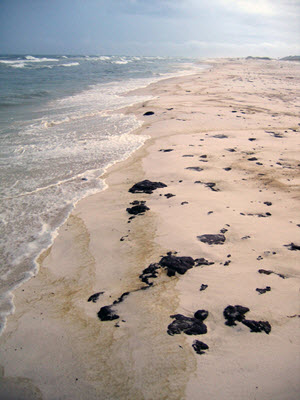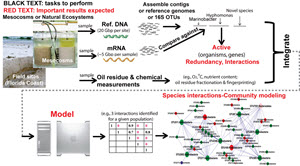
(Click to enlarge) Partially buried oil at Pensacola Beach, Florida, showing oil deposited in intertidal (partially submerged) and supratidal (exposed) sands. Depending on the location of the oil burial, oil-degrading microbes are exposed to very different environmental settings ranging from permanently submerged to permanently dry. The location of the buried oil also affects the oil’s exposure to oxygen, nutrients, and heat and thus impacts the rates of microbial degradation. (Photo by Markus Huettel)
Spilled oil buried in nearshore sediment can persist for many years and act as a long-term source of episodic hydrocarbon contamination in the environment.
Although we have a basic understanding of how fast crude oil degrades in soils, we still do not fully understand what influences the degradation process or the microbial community responsible for oil decomposition in the seabed.
The Gulf of Mexico Research Initiative awarded Dr. Markus Huettel a grant to investigate buried oil’s microbial degradation in coastal environments and create a model that can help predict oil degradation rates and pathways for future spills. His team will combine cutting-edge microbiological and geochemical techniques in the field with targeted laboratory experiments to uncover how microbial communities degrade buried oil under varying environmental conditions.
Microbial oil degradation is most effective in oxygen-rich conditions. Huettel’s team will incubate sediment cores in mesocosms that can simulate oil transport caused by tides, water currents, and air flows. They will collect time-series molecular data to characterize interactions between the environment and microbial communities and will use hydrocarbon composition data to determine the degradation rates of specific hydrocarbon classes. The incubation treatments will vary in oxygen concentration, temperature, and level of nutrients to test how different conditions affect microbial oil degradation.

Click to enlarge) A conceptual overview of the modeling analysis of shore sand microbial communities. (Figure by Kostas Konstantinidis)
The team will use their findings to create a model that links microbial sedimentary oil degradation to key environmental variables. The goal is to present this model in a format that managers and decision makers can use when planning responses to future oil spills. Huettel explains, “This project aims to open the ‘black box’ surrounding the mechanisms of buried oil degradation and generate a tool that can forecast oil degradation pathways and the potential environmental and health risks associated with petroleum hydrocarbons still persisting in the coastal environment.”
The project’s investigators are Markus Huettel of Florida State University and Kostas Konstantinidis and Joel Kostka of the Georgia Institute of Technology. Their project is A Systems Approach to Improve Predictions of Biodegradation and Ecosystem Recovery in Coastal Marine Sediments Impacted by Oil Spills.
************
The Gulf of Mexico Research Initiative (GoMRI) is a 10-year independent research program established to study the effect, and the potential associated impact, of hydrocarbon releases on the environment and public health, as well as to develop improved spill mitigation, oil detection, characterization and remediation technologies. An independent and academic 20-member Research Board makes the funding and research direction decisions to ensure the intellectual quality, effectiveness and academic independence of the GoMRI research. All research data, findings and publications will be made publicly available. The program was established through a $500 million financial commitment from BP. For more information, visit http://gulfresearchinitiative.org/.
